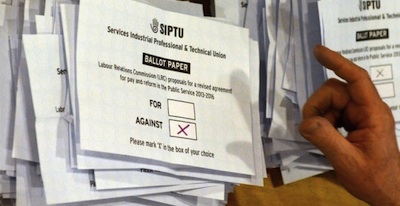
Proposals to extend the current ‘Croke Park’ public service pay agreement have been comprehensively rejected by Ireland’s trade unions.
Two of the country’s biggest trade unions, SIPTU and the Irish National Teachers’ Organisation, have voted against the deal, meaning it will not now be ratified.
The proposals included pay cuts, increment freezes and longer working weeks for no extra pay.
The rejection is seen as a major blow for the 26-County coalition government, which says it needs to secure 300m euro in savings from the public sector pay bill this year.
SIPTU president Jack O’Connor has warned the government not to implement pay cuts, warning a “major, mutually destructive confrontation”, meaning industrial action and strikes.
Opposition parties have urged the government to now recognise that ‘Croke Park II’ is dead and that they should go back to the drawing board.
Socialist Party TD Joe Higgins said SIPTU’s rejection reflected a view that we had come to the end of austerity.
He pointed to a major rally against austerity last Saturday, when up to 10,000 people took to the streets of Dublin against the new home tax and the wider austerity programme.
The event, organised by the Campaign Against Home and Water Taxes, marched from the Garden of Remembrance through Dublin city centre to Dublin Castle, where EU Finance ministers were holding a meeting.
“The unions must respond with a fighting strategy and declare that strong sustained industrial action will meet any moves by the government in that direction,” he said.
“Common cause should be made with the Campaign Against Home and Water Taxes which is currently fighting what will be felt by workers as another attack on their pay in the form of the property tax.
“A concentrated movement of opposition to unjust taxes, austerity and pay cuts with a particular focus on Labour could bring this government down.”
Sinn Fein deputy leader Mary Lou McDonald said the unions’ rejection of the proposals had dealt a “body blow” to the government’s austerity agenda.
“They did so because it was an unfair deal - bad for public sector workers and their families, bad for the public services on which we all depend and bad for the domestic economy.
“The idea that you could take 1 billion euro out of the public service and not hurt the schools that educate our children or the hospitals that care for our sick family members was always absurd.”
The chairperson on eirigi, Brian Leeson drew a comparison with the Great Lockout of 1913.
“One hundred years ago during the Great Lockout the workers of Dublin showed that they were willing and able to stand up to their bullying exploitative bosses,” he said.
“And today the workers have again shown that they will not be intimidated by the threats of government and the ruling class.
“The workers of this country, north and south, have rarely needed a fighting trade union movement as much as they do today. Hopefully the rejection of Croke Park II will represent a significant step on the road to the creation of such a movement.”
![[Irish Republican News]](https://republican-news.org/graphics/title_gifs/rn.gif)
![[Irish Republican News]](https://republican-news.org/graphics/title_gifs/harp.gif)

